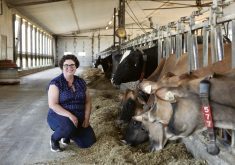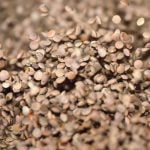By now, most people involved in agriculture have heard something about depression and anxiety disorders. Whether it’s been through the survey of farmer mental health, started in 2015 and highlighted in 2018, or through the efforts of groups like Do More Ag, word has spread.
Now, it’s important that this awareness gets translated into action, which isn’t always as easy.
The results of the 2015 survey, conducted by Dr. Andria Jones-Bitton and colleagues from the University of Guelph, uncovered some disquieting statistics based on data from more than 1,100 farmers across Canada.
Read Also

Sibling squeeze part 6: The emotional stakes of a family legacy
The final instalment in a six-part series exploring the challenges of sibling conflict and the effect it can have on…
- 35 per cent met the criteria for depression classification.
- 18 per cent were classified as low professional efficacy.
- 38 per cent were classified with “high emotional exhaustion.”
- 43 per cent were classified as “high in cynicism.”
In addition, 40 per cent of producers surveyed said they would find it difficult to seek professional help for fear of what others would think.
It is important to understand that farmers responding in the survey “met the criteria” for anxiety disorders and depression on the screening tools that were used in the survey: they were not assessed or evaluated by certified clinicians.
Nevertheless, the figures are a concern. They also do not include incidents where farmers couldn’t find solace or treatment from their troubles and sadly took their own lives. But the numbers do reflect a growing recognition of mental health issues across all facets of Canadian society and their place in overall health. Bell’s “Let’s Talk” Day is one example of positive awareness of something that has been ignored, overlooked — even demonized.
For Jones-Bitton, the survey provided a confirmation of her suspicions based on her research into farmer mental health in Canada. An associate professor of epidemiology in the department of population medicine at University of Guelph, she decided to conduct the survey after hearing stories about farmers struggling with their mental health or dying by suicide.
“I wanted to explore whether our anecdotal stories were indicative of a problem with mental health in Canadian agriculture,” says Jones-Bitton. “Unfortunately, our suspicions were confirmed… However, much good came from that survey. It helped spark important conversations around mental health in agriculture and it helped secure funding for a second round of research that will produce practical outcomes to help our farmers.”

The results also told Jones-Bitton that there’s a need for increased mental health literacy in the agri-food community. She says more needs to be done to help with basic understanding about common mental health conditions, how to recognize when a person is struggling, and how to start a conversation with someone to check in with them and help bridge them to supports.
“Some have described receiving positive feedback from fellow farmers when they shared their feelings of stress, overwhelm, depression or anxiety,” explains Jones-Bitton. “However, others have shared that they are hesitant to speak about their struggles with mental health. Even if everyone believed that there is no shame in mental illness, perceptions of stigma could still remain if we’re not openly talking about mental health.”
That’s another issue with mental illness though. Unlike the more widely acknowledged conditions like heart disease, stroke or cancer, mental illness has had a lower profile, meaning access to rural care is a challenge.
More than farmers
The other aspect that is seldom considered in discussions on mental health within the agri-food sphere is the impact on everyone within the industry. The University of Guelph-led survey was conducted among more than 1,100 farmers, yet spouses, family members, neighbours and even dealers and company representatives are experiencing some form of stress or mental health issues.
Wayne Black has been dealing with anxiety disorder for much of the past 12 months. Although he began treatment last September, he said he can look back at the past four to five years in which he’s been heading towards this crossroads. In that time, he moved from a full-time farmer to a sales and product manager with two other companies. His approach in business has been the same as it was as a farmer: push hard, and strive for efficiency by maximizing production.
“We’re trying to push more out of our crops and our livestock,” says Black. “Some of us are trying to do the same with ourselves.”
Black, now sales manager with Sunderland Co-op, southwest of Lindsay, Ont., says it’s a warning sign. “The growers I’ve talked with who have this issue are the ones pushing the limits for their crops or their livestock.”
That’s part of what Black has found to be disturbing about his own odyssey. On August 7 last year, he convinced himself to seek treatment for his list of ailments. He wasn’t sleeping or eating well, he was working too many hours, was quick to become confrontational, he had what he called “anxiety pains” in his forearms and chest, and he couldn’t keep his thoughts from racing out of control. By September 21, his doctor urged him to take a leave from work yet it wasn’t until October 23 that Black realized how bad the situation had become. Since then, he’s spent time away from work, easing back in to his duties at the co-op, working to re-establish his sleep patterns, to eat healthy and push away from the desk as needed.
Black has also noticed a disturbing trend among co-workers and colleagues across the sector: many are in much the same boat as he is. Although some thank him for his openness and courage in sharing, others fail to understand that they’re falling into the same trap.
“It’s not just work or a relationship or the bills or the finances or the weather — it’s not just one of those, it’s a combination,” says Black, adding that he can be his own worst enemy. “I’m trying to eat better and I’m trying to get better sleep patterns or work more ‘normal’ hours, but it’s not our managers driving us to it, it’s ourselves, it’s driven personally from within due to workplace demands. When I was farming, I drove those hours myself.”
Not all bad
There is room for optimism. More people like Black are acknowledging the impact of life’s many stresses and that they may need help from outside of their own circle of family and friends.
Still, it takes courage. Black has encountered some who’ve demanded to know why he took time off, as though it’s their right to intrude.
For Kim Keller, mental illness in agriculture is an immediate concern and something she’s been striving to improve since 2015. At that time, it was the #HereforFarmers T-shirt campaign which she and her co-worker Himanshu Singh initiated with their company, Farm at Hand, an ag-tech venture.
“It picked up again in 2017 when I received a message from someone who had just lost a farming client to suicide,” says Keller, who’s now one of four partners involved in the Do More Agriculture Foundation. She balances the added demand for speaking engagements and volunteer work with her full-time duties at her farm near Melfort, Sask. “I was frustrated that there was nothing I could give him that was any different from what I could have given him two years before that. And I was frustrated with our industry for letting producers get to the point where they felt that suicide was the only option for them.”
That reignited everything for Keller, and she began a Twitter campaign, asking for compassion for those less fortunate and urging others to become involved. Shortly after that, she banded together with Singh, Lesley Kelly and Kirk Muyres to form Do More Ag.
“When I look back on the changes that have happened over the last year, it’s absolutely incredible,” says Keller.
Rural Canada is sparsely populated and funding allotments for health care in smaller centres are already stretched to the limit. Rural hospitals may have less of a chance of closing since they’re more of an essential service — which may not be the case with larger urban facilities. Unfortunately, mental health services can be spread too thin.
That doesn’t deter Keller and her colleagues with Do More Ag. Instead, it inspires them and pushes them to strive to normalize mental illness and reduce the stigma that comes with anxiety, depression or other conditions.
There’s another crucial aspect too.
Up to 95 per cent of people in a conference hall might put their hands up if you ask them if they’ve had any first aid training, says Keller. In fact, it’s often required on many jobs and is frequently offered in high school.
Ask the same question about mental health first aid training, Keller says, and the percentage of hands going up might be in single digits.
“It’s never been a priority or something that’s been offered,” says Keller. “When we look at the stats, 40 per cent of respondents wouldn’t seek help because they’re worried about what their friends, families and friends think. That’s the number that hits me the hardest because those are the people who need to go get that help.”
Greater demands, greater scrutiny
Today, on top of volatile markets and weather, and in addition to their perennial concerns about field and barn performance, farmers have a slate of new worries, many fed by consumer myths. It’s a pattern that Briana Hagen points to as significant. It’s hard enough when farmers are expected to “suck it up” and keep going. Now they also face a higher level of intrusiveness from non-farmers.
“That vilification of farmers takes a huge toll on farming families,” says Hagen, a PhD candidate in the department of population medicine in the University of Guelph’s Ontario Veterinary College, working with Jones-Bitton. “Farmers talk about how they’re trying to feed people who just want to criticize them, and that’s hard, especially when it’s this unique occupation which is also your culture and your lifestyle.”
The size of the industry also adds to the stigmas associated with mental illness. Despite agriculture’s overall success, farming in Canada keeps getting smaller. The number of primary producers continues to decline, which challenges those who may need help but are concerned with “what the neighbours think.”
“It is sad but there’s a lot of work that still needs to be done in terms of reducing that stigma,” says Hagen. “Those involved with Do More Ag are doing a great job at making talking about mental health accessible and showing faces of people who look just like you and talk like you and work like you, who have had mental health struggles. Those people have tackled their issues and that’s important when we’re trying to break down these barriers.”
Hagen notes there’s also a tendency in agriculture to wear stress like a badge of honour. People are convinced that it’s a status symbol to say, “I worked 100 hours this week!” She’s trying to change that conversation and refocus farmers’ efforts on helping them with their wellness so they can return to doing what they do best: farming.
Deborah Vanberkel agrees with Hagen’s approach to stress as something akin to a matter of pride.
“Stress is not a competition: everybody handles things differently and it’s a matter of people understanding what that means,” says Vanberkel, a registered psychotherapist based in Napanee, Ont., who offers therapy to those struggling with mental health issues. She and her husband also operate a dairy operation outside of town. “No one person’s story is worse than another’s because everyone reacts differently.”
For Vanberkel, awareness is the biggest and most important factor in turning the survey numbers to something positive. In the past, these “feelings” weren’t something to be discussed. Although she’s not a frequent user of social media, she’s encouraged by what she’s seen on Twitter. Vanberkel points to cancer awareness 40 or 50 years ago, when no one talked about it or people whispered the word in reference to a neighbour. It’s to the point where it’s been normalized with a united front and a commitment to fight the disease in all its forms.
It creates a path to success, and it creates an achievable goal, Vanberkel says. “People are unsettled by mental illness because they don’t know the information.”
















